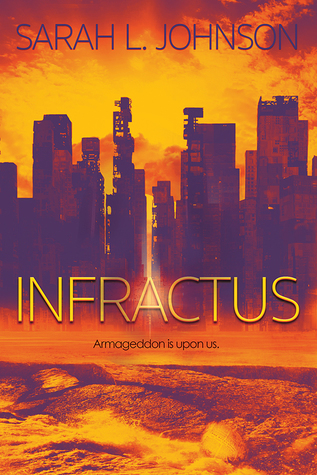
Infractus
Author: Sarah L Johnson
Publication date: 10 April 2018
Publisher: Coffin Hop Press
Reviewer: D C White
Infractus, by Sarah L Johnson is a not-quite book. It’s about a not-quite assassin, operating on behalf of a not-quite corporation, after a not-quite apocalypse. Is it good? Not quite.
Apocalypses today are a shoddy lot. In the good old days of Liebowicz, Buck Rogers and Mad Max, an apocalypse meant the utter rout of humanity, which was to be rebuilt over centuries into a totally different society. In modern years, however, The Hunger Games and The Maze Runner have shown us a new type of apocalypse, where society changes overnight and a ruthless fascist government appears, but people (particularly those in the 15-25 age range) still have all of their teeth and are supermodels in the midst of starvation and deprivation, and don’t spend their days in dung-infested hell-holes fighting with broken bottles over half a rat.
Infractus lies squarely in the second camp. Somewhere around 2020 someone blows up a lot of stuff. Our Hero (we never learn his name) is a bit hazy on what, or how, or why. After the requisite, gritty urbanism of picking through a few bins—almost prostituting himself and surviving with no internet (OMG!)—he gradually learns that, in the chaos following the apocalypse, the DREADED EVIL Panopticon Corporation has taken over the world.
The reasons and mechanism for the rise of the dreaded evil Panopticon Corporation remain a mystery. People have been trying to take over the world for quite a while now, from Alexander the Great to Adolf Hitler, and the dreaded evil Panopticon Corporation not only managed it with no electricity or communications network but got it all done the first time, which has got to be worth a gold star or two.
Within a dozen years, all of society (at least in North America; nowhere else seems to matter) is back to full capacity, replete with wineries, universities, privately-owned aircraft, holidays to Bali, electric cars and carpet salesmen. How on earth do carpet salesmen survive an apocalypse, and if they did why would they go back to selling carpet?
The dreaded evil Panopticon Corporation is a mystery in itself. We never see who they are, or why, but they take on our hero and train him as an assassin at their special post-apocalyptic assassin school (handy). That they have the resources to do this only a few years since the collapse of society, so utterly that a private corporation was able to defeat the combined militaries of every nation on earth, is little short of miraculous. That they would want to is another. Any corporation whose employees continue to clock in despite explosions large enough to make entire armies not show up for work must have a hell of a benefits plan. Could the employees be getting the same motivational training as the carpet salesmen? Even the total dissolution of the world was not enough to stop the loyal legions of accountants, procurement officers, HR, payroll staff, middle management, factory staff and executives of the dreaded evil Panopticon Corporation from showing up to work, changing their corporate goals from whatever it was they were doing to world domination, and getting it done. Frankly, any organisation that motivated probably deserves to win.
Our hero exists in a similar logical vacuum. An orphan brought up by nuns and seemingly with a guardian angel who makes him death-proof, he stumbles his way through the first half of the book existing on neglect, almost-rape and whatever else he thinks he can get away with. Uplifting the book is not. Religious overtones it has in spades.
Halfway through Infractus—with no bad guy, plot, or hero name in sight—things change very fast. The hunter becomes a different hunter, for a different team. It’s a seismic shift, but unfortunately the change of pace is not accompanied by a change of style, and the reader is left with the same plot-free, meandering narrative albeit with some new scenery.
This is the real weakness of the book: a lack of purpose. It doesn’t exist to show us the world. At no point does our hero have a target or a plan, and the reader is left wondering when something, anything, is going to happen past the serial, localised firefights our hero has imposed on himself by others.
It’s clear from the book’s ambiguous and abrupt ending that the author has more in store for us (probably a trilogy). One can only hope that a) a villain; and b) a plot make themselves known in due course.
If apocalypses are this easy to survive, they aren’t apocalypses.
